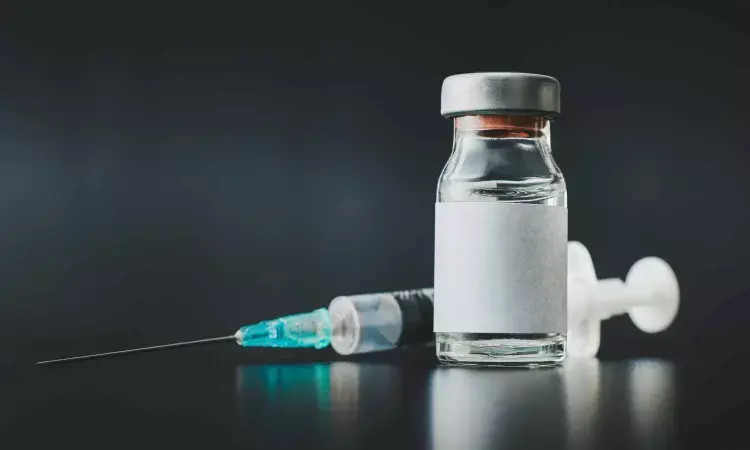- Home
- Medical news & Guidelines
- Anesthesiology
- Cardiology and CTVS
- Critical Care
- Dentistry
- Dermatology
- Diabetes and Endocrinology
- ENT
- Gastroenterology
- Medicine
- Nephrology
- Neurology
- Obstretics-Gynaecology
- Oncology
- Ophthalmology
- Orthopaedics
- Pediatrics-Neonatology
- Psychiatry
- Pulmonology
- Radiology
- Surgery
- Urology
- Laboratory Medicine
- Diet
- Nursing
- Paramedical
- Physiotherapy
- Health news
- Fact Check
- Bone Health Fact Check
- Brain Health Fact Check
- Cancer Related Fact Check
- Child Care Fact Check
- Dental and oral health fact check
- Diabetes and metabolic health fact check
- Diet and Nutrition Fact Check
- Eye and ENT Care Fact Check
- Fitness fact check
- Gut health fact check
- Heart health fact check
- Kidney health fact check
- Medical education fact check
- Men's health fact check
- Respiratory fact check
- Skin and hair care fact check
- Vaccine and Immunization fact check
- Women's health fact check
- AYUSH
- State News
- Andaman and Nicobar Islands
- Andhra Pradesh
- Arunachal Pradesh
- Assam
- Bihar
- Chandigarh
- Chattisgarh
- Dadra and Nagar Haveli
- Daman and Diu
- Delhi
- Goa
- Gujarat
- Haryana
- Himachal Pradesh
- Jammu & Kashmir
- Jharkhand
- Karnataka
- Kerala
- Ladakh
- Lakshadweep
- Madhya Pradesh
- Maharashtra
- Manipur
- Meghalaya
- Mizoram
- Nagaland
- Odisha
- Puducherry
- Punjab
- Rajasthan
- Sikkim
- Tamil Nadu
- Telangana
- Tripura
- Uttar Pradesh
- Uttrakhand
- West Bengal
- Medical Education
- Industry
Low Cardiovascular Complications Observed in Post-COVID-19 Vaccine Myocarditis: JAMA

A recent study published in the Journal of American Medical Association unveiled the long-term outcomes of myocarditis in young individuals following COVID-19 mRNA vaccination which had generally favorable prognosis when compared to conventional myocarditis. However, the questions about ongoing management and the full scope of long-term complications remain unanswered.
The study was conducted using the French National Health Data System which analyzed data from 4,635 individuals. These participants were aged 12 to 49 years who were hospitalized for myocarditis between December 27, 2020 and June 30, 2022. The participants were categorized into 3 groups: those who developed myocarditis within seven days after receiving a COVID-19 mRNA vaccine (postvaccine myocarditis), those who developed myocarditis within 30 days of a SARS-CoV-2 infection (post–COVID-19 myocarditis) and those with conventional myocarditis unrelated to COVID-19 or vaccination.
The study revealed that patients with postvaccine myocarditis were predominantly younger men, with an average age of 25.9 years when compared to 31 years for post–COVID-19 myocarditis and 28.3 years for conventional myocarditis. The incidence of cardiovascular complications over an 18-month follow-up period was markedly lower in the postvaccine myocarditis group than in the conventional myocarditis group.
Also, only 32 out of 558 patients with postvaccine myocarditis underwent adverse cardiovascular events when compared to 497 out of 3,779 patients with conventional myocarditis. The weighted hazard ratio (HR) for these events was 0.55, indicating a 45% lower risk in the postvaccine group. In contrast, the patients with post-COVID-19 myocarditis had a similar risk of cardiovascular complications as the individuals with conventional myocarditis, with 36 out of 298 patients affected and a weighted hazard ratio of 1.04.
The study also analyzed the medical management of patients after hospital discharge. It found that the frequency of medical procedures and drug prescriptions in patients with postvaccine myocarditis was comparable to those with post–COVID-19 and conventional myocarditis. These findings reassure that myocarditis following COVID-19 mRNA vaccination generally leads to fewer long-term cardiovascular complications than conventional myocarditis. However, the need for extended medical management in young and otherwise healthy men highlighted the importance of continued monitoring and research.
As the long-term prognosis and optimal management strategies for postvaccine myocarditis remain uncertain, clinicians should remain vigilant in follow-up care, ensuring that any future complications are promptly addressed. Overall, this study illuminates the importance of ongoing research to fully understand the long-term implications of myocarditis related to COVID-19 vaccines and SARS-CoV-2 infection.
Source:
Semenzato, L., Le Vu, S., Botton, J., Bertrand, M., Jabagi, M.-J., Drouin, J., Cuenot, F., Zores, F., Dray-Spira, R., Weill, A., & Zureik, M. (2024). Long-Term Prognosis of Patients With Myocarditis Attributed to COVID-19 mRNA Vaccination, SARS-CoV-2 Infection, or Conventional Etiologies. In JAMA. American Medical Association (AMA). https://doi.org/10.1001/jama.2024.16380
Neuroscience Masters graduate
Jacinthlyn Sylvia, a Neuroscience Master's graduate from Chennai has worked extensively in deciphering the neurobiology of cognition and motor control in aging. She also has spread-out exposure to Neurosurgery from her Bachelor’s. She is currently involved in active Neuro-Oncology research. She is an upcoming neuroscientist with a fiery passion for writing. Her news cover at Medical Dialogues feature recent discoveries and updates from the healthcare and biomedical research fields. She can be reached at editorial@medicaldialogues.in
Dr Kamal Kant Kohli-MBBS, DTCD- a chest specialist with more than 30 years of practice and a flair for writing clinical articles, Dr Kamal Kant Kohli joined Medical Dialogues as a Chief Editor of Medical News. Besides writing articles, as an editor, he proofreads and verifies all the medical content published on Medical Dialogues including those coming from journals, studies,medical conferences,guidelines etc. Email: drkohli@medicaldialogues.in. Contact no. 011-43720751


